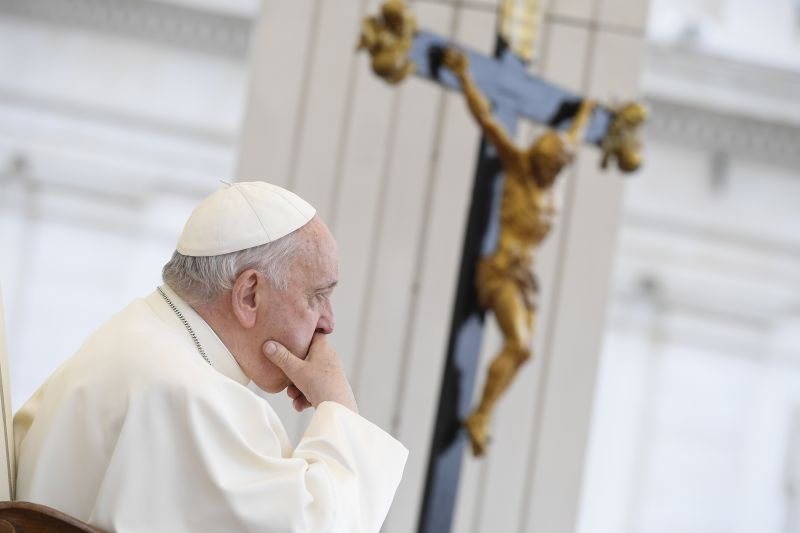
Vatican City, Apr 24, 2020 / 11:00 am (CNA).- Cardinal Marc Ouellet, prefect of the Vatican’s Congregation for Bishops, said Friday that the Church needs more women involved directly in priestly formation in seminaries.
“I believe that for the priest, learning to relate to women in the context of formation is a humanizing factor which promotes the balance of man’s personality and affectivity,” Ouellet said in an interview in the May edition of the Donne Chiesa Mondo magazine also published on the Vatican News site April 24.
In the interview the Canadian cardinal said he believed that “the experience of collaborating with women on an equal level helps the candidate [for priesthood] to envisage his future ministry and how he will respect and collaborate with them.”
“If we do not start during formation, the priest risks to live his relationship with women in a clerical way,” he suggested.
Responding to questions on women in priestly formation, Ouellet said he thought the Church would benefit greatly from an increased presence of women on seminary formation teams, as theology, philosophy, and spirituality teachers, and “in particular in vocational discernment.”
“In this field we need the opinion of women, their intuition, their ability to grasp the human side of candidates, their degree of emotional or psychological maturity,” he stated.
Ouellet also said he thought women had a lot to contribute in seminaries’ human formation, an aspect which he argued is often underdeveloped.
“It is necessary to evaluate the degree of freedom of the candidates, their ability to be coherent, to establish their life plan, and also their psychosocial and psychosexual identity,” he said.
The cardinal added that women could also be of help in spiritual accompaniment but said he thought it was best for only priests to be spiritual directors to seminarians.
“It is not just a matter of promoting women, but of considering them as an integral part of all training,” he stated.
Asked why there is sometimes a “mutual ‘unease’” in relationships between priests and women, the cardinal said the problem likely went deeper than a lack of formation to the way “the woman is treated in families.”
Unease, he suggested, is based on fear, which he argued is more often present in men toward women.
“For a priest, for a seminarian, the woman represents danger! While in reality, the true danger is men who do not have a balanced relationship with women,” he said, arguing that “this is what we must radically change.”
“For this reason, during training it is important that there is contact, comparison, exchanges” with women, according to Ouellet. “This helps the candidate to interact with women, in a natural way, and also to face the challenge that the presence of women represents, attraction towards women.”
“This must be taught and learned from the beginning, not isolating future priests who then find themselves brutally in reality; and then they can lose control,” he said.
Asked if he thought it was true that more women in seminary formation could have helped prevent some of the incidents of abuse in the Church, Cardinal Ouellet said, “there is certainly a part of truth in this.”
He noted that when interaction between men and women is absent “there is a risk of developing compensations…” which may be expressed in a bad relationship with food, “in the exercise of power, or in closed relationships, a closure that becomes manipulation, control .. and which can lead to abuse of conscience and sexual abuse.”
Donne Chiesa Mondo (Women Church World) is a monthly magazine published by Vatican newspaper L’Osservatore Romano. The interview with Ouellet is part of the May edition, to be published April 26. The interview was also made available in Italian and French on Vatican News April 24.
If you value the news and views Catholic World Report provides, please consider donating to support our efforts. Your contribution will help us continue to make CWR available to all readers worldwide for free, without a subscription. Thank you for your generosity!
Click here for more information on donating to CWR. Click here to sign up for our newsletter.




What is needed is a reconsideration of seminaries, especially during a time of shrinking diocesan budgets and low numbers of potential vocations. Women are not needed in seminary formation; those who are considering holy orders should be working in a parish during their formation, and here they can be scrutinized as well as learning how to relate to others.
The “human development” that is required by many men will not be supplied by academics or bureaucrats or empowered women.
Shepherds are not born but they are made. Men and women need to be offered responsibilities in the formation of their shepherds. That in itself is part of the service to the future well being of the flock.